Clarke was the first black professional in Scotland and went on to a successful career in England, becoming the first black player to score a goal in the Football League.
William Gibb Clarke (or Clark) was born in 1878 in the Ayrshire town of Mauchline. Just like Andrew Watson, he had Guyanese heritage: he took his colour from his father Alexander who had been born in British Guiana, the product of a union between a local woman and Duncan Clark, a Scot who had gone to the colony as a wood cutter. It appears that, after Duncan Clark died there in the 1850s, sufficient money was available to send Alexander to Scotland to complete his education. As a 16-year-old he arrived at the remote Barr School on the Kintyre peninsula, about 20 miles north of Campbeltown, and lodged with the schoolmaster. There may have been a family connection with the area.
Amazingly, there is a description of him in 1859: 'Among the scholars was a private pupil of the master's, a respectably-born black boy, who a fortnight before had arrived from the West indies, and whose tawny complexion and woolly head looked very remarkable among the red-haired and fair-visaged Highlanders.'
Alexander settled in Ayrshire, where he worked as an engine fitter and married Jemima Cunningham. Together they raised a large family and their seventh child (of eleven) was William, born in 1878.
When Willie was a small boy the family moved to Glasgow, and it was here that he took his first steps in football. From the juvenile side Kelburn in 1896 he joined Crown Athletic, a junior team whose home ground was Fauldhouse Park in the Gorbals. (Most accounts say he also played for Benburb, but this is inaccurate.)
The Scottish Referee soon spotted his potential and wrote 'A very promising player is W Clark, the Crown outside right. He shoots on the run with great force and gets along smoothly with his new partner.'
He was also due to play for the Glasgow Junior FA before events took a hand and he turned senior.
Professional clubs had started to take an interest and in April he was invited for trials by Preston North End and Celtic, but had to decline both due to a bout of bronchitis. That opened the door for Third Lanark, and at the end of the month he played a trial for them in a friendly against Blantyre, making a good enough impression to be invited back. In May 1897 he played outside right for the Third Lanark first team in three Glasgow League games, once against Queen's Park and twice against Rangers, scoring in a 4-3 win over the latter.
He started the 1897-98 season in the Third Lanark reserve team but after just a handful of games, in October he fractured his collarbone in a friendly at Hampden against Queen's Park Strollers. This put him out of action for weeks, not just from the football field but would also have made it difficult to follow his profession as an upholsterer.
He does not appear to have played again that season and Thirds released him to join Arthurlie, in the Scottish Football Combination. They were a good side and reached the Scottish Qualifying Cup final, losing to East Stirlingshire, while in the Scottish Cup they were knocked out by his old club Third Lanark in the first round.
This posed a problem for the club as several players, including Clarke, were registered to Scottish League sides. Third Lanark still held Clarke's league registration and wanted a transfer fee of £25, so although East Stirlingshire would have preferred to keep him they simply didn't have the money and had to let him go.
Under the rules of the time he was able to escape the requirement for a fee by moving to England, so quite by chance this was the launchpad to a fine career. He pitched up at Bristol, and never returned.
He spent the 1900/01 season with Bristol Rovers in the Southern League, making 20 league appearances for the club as well as scoring a hat-trick against Weymouth in the FA Cup.
This was the springboard to greater things and in 1901 he signed for Aston Villa. He spent four years at Villa Park, becoming the first black player to score a goal in the Football League on Christmas Day 1901. After a couple of seasons he drifted out of the picture and moved on to Bradford City in 1905.
Clarke served throughout the First World War in the Middlesex Regiment and the Royal Engineers. Having married for a second time in 1914 (his first wife died suddenly), he spent the rest of his life in Tunbridge Wells where he worked as a carpet fitter, and died there in 1949.
William Gibb Clarke
Born 3 March 1878 Mauchline, Ayrshire
Died 25 January 1949, aged 70 at Kent and Sussex Hospital, Tunbridge Wells, Kent.
Football career
1895-96 Kelburn (Glasgow Juveniles);
1896-97 Crown Athletic (Glasgow Juniors);
Trials for Third Lanark Apr-May 1897; signed as a professional June 1897.
1897-98 Third Lanark (played for reserves in the Scottish Football Combination; injured in October).
1898-99 Arthurlie (Scottish Football Combination; Scottish Qualifying Cup finalists)
1899-00 East Stirlingshire (Scottish Central Combination and Scottish County League)
1900-01 Bristol Rovers (Southern League).
1901-05 Aston Villa (Division One).
1905-09 Bradford City (Divisions Two and One).
Dec 1909-11 Lincoln City (Division Two).
1911-12 Croydon Common (Southern League Division Two).
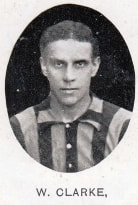
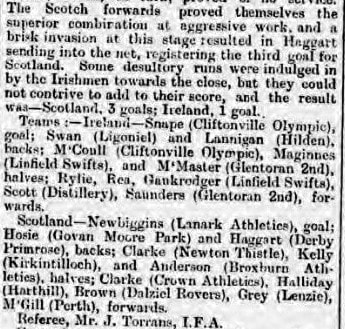
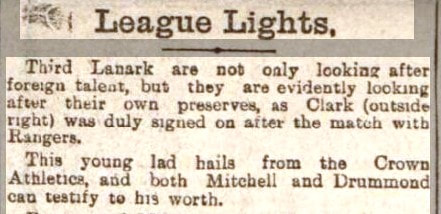
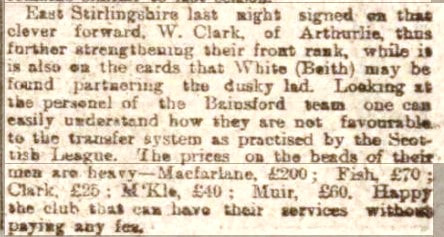
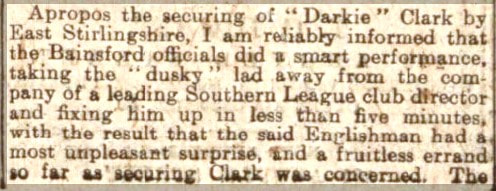
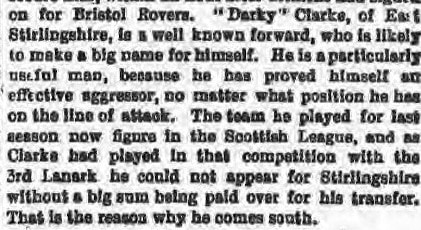
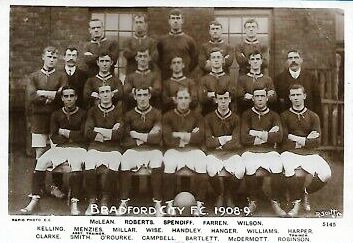
 RSS Feed
RSS Feed